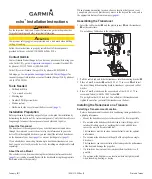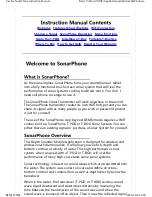
echo
™
Installation Instructions
WarnIng
See the
Important Safety and Product Information
guide in the product box
for product warnings and other important information.
cautIon
Always wear safety goggles, ear protection, and a dust mask when drilling,
cutting, or sanding.
Follow these instructions to properly install the all of the components
provided with your echo 100/150/200/300c/500c /550c.
contact garmin
Contact Garmin Product Support if you have any questions while using your
echo. In the USA, go to
by phone at (913) 397.8200 or (800) 800.1020.
In the UK, contact Garmin (Europe) Ltd. by phone at 0808 2380000.
In Europe, go to
and click
Contact Support
for
in-country support information, or contact Garmin (Europe) Ltd. by phone at
+44 (0) 870.8501241.
tools needed
• Drill and drill bits
•
3
/
8
in. wrench or socket
• Masking tape
• Number 2 Phillips screwdriver
• Marine sealant
• Hardware for the swivel mount (bolts or screws) (
Installation Preparation
Before permanently installing any part of your echo, plan the installation by
determining the location of the various components. Verify that the cables are
long enough to connect the components to each other and to power.
about the transducer
The transducer is the component of your echo that transmits sound waves
through the water and receives them to relay the information to your echo
device. With the supplied hardware, you can install the included transducer
on the transom of your boat (
) or on your trolling motor (
).
If you already have an existing Garmin 6-pin dual-beam transducer on your
boat, you can use it with your echo device by installing an adapter cable (sold
separately).
about the echo Mount
The echo device can be mounted using the included swivel-mount bracket
), or it can be mounted flush with the dashboard using the appropriate
flush-mount kit (sold separately).
When planning a mounting location, choose a location that you can see as
you operate your vessel, provides easy access to the keys on the echo, and is
the appropriate distance from a compass (
assembling the transducer
1. Insert the rubber washer
➊
and the plastic spacer
➋
into the transducer
➌
at the same time.
Do not add any lubrication to the rubber washer.
➊
➋
➍
➎
➏
➐
➌
2. Pull the cable back and slide the transducer into the mounting bracket
➍
.
3. Place a 5 mm flat washer
➎
on the 10-32 x 1.75 in. screw
➏
and insert
the screw through the mounting bracket, transducer, spacer, and rubber
washer.
4. Place a 5 mm flat washer on the exposed end of the 10-32 x 1.75 in.
screw, and fasten it with the 10-32 lock nut
➐
.
Do not tighten the 10-32 lock nut. You will adjust the transducer and
tighten the nut after you install the transducer on the boat.
Installing the transducer on a transom
Selecting a transom-mount Location
Select a transom-mount location while considering these guidelines for
optimal performance.
• Mount the transducer as close to the center of the boat as possible.
• Do not mount the transducer behind strakes, struts, fittings, water
intake or discharge ports, or anything that creates air bubbles or
causes the water to become turbulent.
The transducer must be in clean (non-turbulent) water for optimal
performance.
• Do not mount the transducer in the path of the propeller on single-
drive boats.
The transducer can cause cavitation that can degrade the performance
of the boat and damage the propeller.
• On twin-drive boats, mount the transducer between the drives, if
possible.
• Do not mount the transducer in a location where it might be jarred
when launching, hauling, or storing.
February, 2011
190-01312-02 Rev. B
Printed in Taiwan
contents
contact garmin
tools needed 1
Installation Preparation
about the transducer 1
about the echo Mount 1
assembling the transducer 1
Installing the transducer on a transom 1
Selecting a transom-mount Location
Installing the transom-Mount Hardware 2
Installing the transducer on a trolling Motor
Selecting a Swivel-Mount Location
Preparing the Swivel-Mount Base Installation
Installing the echo Device in the Swivel Mount
Installing the cables and connectors
Wiring to Power 4
connecting the cables to an echo 100/150/300c 4
connecting the cables to an echo 200/500c/550c 5









